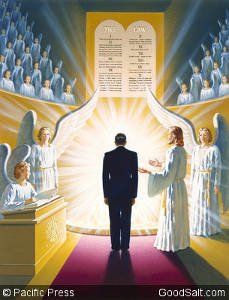May You Be Sealed!
 Some Adventists feel apologetic about the “investigative judgment,” and others have come to deny it altogether. But an investigation of professed believers is clearly taught in the parable of the wedding feast (Matthew 22:1-3). A study of the Hebrew sanctuary services tells us that the Day of Atonement was a time of judgment in which those professing to be Israelites were affirmed as members of the covenant community or excluded because of rebellion. And from these, as well as Revelation 4-6, Daniel 7-9, we get our understanding of the investigative judgment. 1
Some Adventists feel apologetic about the “investigative judgment,” and others have come to deny it altogether. But an investigation of professed believers is clearly taught in the parable of the wedding feast (Matthew 22:1-3). A study of the Hebrew sanctuary services tells us that the Day of Atonement was a time of judgment in which those professing to be Israelites were affirmed as members of the covenant community or excluded because of rebellion. And from these, as well as Revelation 4-6, Daniel 7-9, we get our understanding of the investigative judgment. 1
Even our understanding of our place in history is based on the prophecies in Daniel 7-9. The “seal” of that prophecy, to quote the angel expositor to Daniel, was the ministry of Jesus Christ as the “Anointed One” (Daniel 9:25-26). He is a historical figure that we can date to a close margin of error. That’s why we know that the date of October 1844 is accurate. So far removed from the Biblical context, we didn’t understand it prior to 1844 and many still do not understand it.
Why are we the only ones teaching the historicist method of prophetic interpretation? We really aren’t the only ones. but we do appear to be in the minority. It is a testament to the astounding success of the Counter-reformation that the other two non-biblical (contrary to the angel’s exegesis) interpretations dominate non-Adventist Christian thought.
Part of the difficulty we face in understanding the concept of an investigative judgment is that we are so far removed from the Biblical context. We are surprisingly ignorant of the significance of the New Moon Festivals that culminated in the Day of Atonement. We have a “modern” idea of judgment that is unrelated to Biblical understanding of judgment.
If God were a benevolent tyrant (an oxymoron), He would only need an instant in time to decide everyone’s fate — past, present and future. (This is, in part, the kind of personage Satan has made God out to be.) The truth is far more interesting. When we read the first chapter of Job and realize that Adam is called a son of God (being that Adam had no biological father) we can begin to understand that we are not alone in the universe — contrary to popular Christian beliefs.
When Satan presented himself as the representative of this earth (in Adam’s place), he was doing so among all the other representatives of other ‘solar systems’ who were participating in God’s chosen form of government. These ‘sons of God’ were also present at the creation of the earth. (See Job 38:6,7) Understanding this gives much more significance to God’s challenge to Satan regarding Job’s righteousness.
Consider that God is answering Satan’s charges against Him in how He deals with us. Consider also that there are beings who will someday call us neighbors who are concerned about who we really are. Daniel talks about judgment thrones (plural) and Revelation talks about twenty-four elders. Consider all the lives of the past millennia and God’s individual interventions on behalf of His people to review for the benefit of the “jury,” and you begin to understand the time-frame.
When Jesus comes, He says He will have His reward for His faithful servants with Him. Revelation teaches a millennium of judgment. It also speaks of a resurrection of the condemned. We might think of this as the sentencing phase of the judgment, when the wicked will be confronted with their record, accept the verdict and then face the consequences of their choices.
But on a personal level, let us embrace judgment in the biblical sense. The Israelite New Moon festivals were about family, then clan, then tribe, then national reconciliation — ultimately leading to reconciliation with God on the Day of Atonement. We are currently in a period of time where we are invited to reconcile with our brothers and sisters and with Christ and find joy in the love of Christ that flows out through all who are In-Him. The Day of Atonement greeting among Israelites was roughly translated, “May you be sealed!” Now that should be heavy with meaning for us today! 2
The Israelite New Moon festivals were about family, then clan, then tribe, then national reconciliation — ultimately leading to reconciliation with God on the Day of Atonement. We are currently in a period of time where we are invited to reconcile with our brothers and sisters and with Christ and find joy in the love of Christ that flows out through all who are In-Him. The Day of Atonement greeting among Israelites was roughly translated, “May you be sealed!” Now that should be heavy with meaning for us today! 2
When we consider Satan’s fate, we need to consider that he turned in rebellion from God from within His presence. There was nothing more God could do to reveal His character to Him so that He might draw Him into His love. For the mighty angel who rebelled there is no turning back. Ellen White speaks to this specifically and the Bible hints at it.
Satan will see his rebellion through to the burning end with a determination fallen humans cannot fathom. This is not about being denied opportunities, it is about spurning God’s love until there is nothing left within you to respond. Among humans this is referred to as the unpardonable sin.
May you be sealed!
- Judgment Day Image © Pacific Press from GoodSalt.com ↩
- “May You Be Sealed” Image © Jeff Preston from GoodSalt.com ↩

Your statement, “The Day of Atonement was a time of judgment in which those professing to be Israelites were affirmed as members of the covenant community or excluded because of rebellion” is a clear revelation of judgment in the ancient Israelite community as well as our day today. Here we’ve been jumping through hoops desperately trying to prove from scripture that there is a judgment going on right now, and it has always been right in front of us. How blessed we are to know and understand these ancient feasts and the truth they reveal!
I understand from the from the Sanctuary service and it’s rituals that Jesus Christ died to remove the penalty of death from us, Rom 6:23 For the wages of sin is death;
1 Cor 15:21 For since by man came death, by man came also the resurrection of the dead.
But the sins we commit we have to confess and forsake in order to obtain that gift. The death penalty has been removed by the death of Jesus but if we parish it will be because we refuse accept that gift.Christ died for us does not mean that we automatically are saved.Although the grace provided is free, the death penalty is removed but the sins commit are to be confessed just as the sinners were to bring animal and confess
their sins by laying hands on the head of the animal.
Thank you Andrew, for showing us how Biblical this teaching is. It makes me very sad when people say Seventh-day Adventists just made this up to cover their embarrassment over 1844. First of all, it was not an embarrassment, it was a heartbreaking disappointment. Big difference! Secondly there were no Seventh-day Adventists in 1844! Seventh-day Adventist did not create this teaching. This teaching created Seventh-day Adventism. Thank you for showing us how this teaching has always been “right in front of us.”
Notice that in the wedding feast, both the guest wearing the wedding gown and without the gown were able to enter the wedding hall.
Does it mean that both bad and good will enter heaven and wait for Jesus to inspect them one by one and then send out those not in proper attire?
One common all the guests have was that they both responded positively to the invitation that’s why they were present in the wedding? The only difference was that some did not follow to wear the appropriate attire for the wedding.
The meaning of this parable is that, ALL WHO PROFESSED TO BE CHRISTIANS, ALL WHO ACCEPTED JESUS AS THEIR PERSONAL SAVIOR HAVE THEIR NAMES RECORDED IN THE BOOK OF LIFE. This is the requirement to be saved; to have our names written in the book of life.
But when Jesus inspect our names, will we be found wearing the right garment, his robe of righteousness? If not, then he will erase our names in the book of life (send us out of the wedding feast)
This is the Day of Atonement, the investigative judgment. All names in the book of life are being investigated in the heavenly sanctuary today erasing the names of those professed Christians who are not truly converted and leaving only the names of the genuine Christians who deserve glorification.
Would it be correct to say: God cleanses the individual human Temple of the Holy Ghost with blood and God cleanses the earthly Sanctuary with blood. God cleanses the Heavenly Sanctuary with “better” blood, once for all cleansing the individual, the earthly Sanctuary and the Heavenly Temple. At every stage it is only by/with/through the blood of Jesus Christ Himself?
Isn’t there judgment of freedom when the surrendered individual is cleansed? Isn’t there judgment when the corporate is cleansed? But when the corporate is cleansed, why are we going back to the already done cleansing of the individual, when in fact the corporate judgment is a singular definitive cleansing of the corporate by dumping the responsibility of sin on the demonic cause, followed by total annihilation of the sin problem, including those who decided to keep their sin condition?
Your question makes assumptions about judgement that I also do not hold. We do approach judgement quite negatively in modern times, and for good reason. It was not always so. Witness the Biblical stalwarts anxious for judgement to come. What was it they desired? even demanded? How did they see it? How is it different from what we assume?
We teach that the investigate judgement is ongoing right now. The vestibule to the wedding hall finds its loose analog in the church today. The “shaking” would then be seen be part of the judgement starting at the church. We should probably recognize that parables should not be made to “stand on all four.” The parable teaches that the wedding garment is important for those who respond to the invitation to the wedding feast. Those who do not accept it will not enter into the feast.
The one who came to the feast without a wedding garment is not the judge in the parable. But the King is the Judge who determines who will enter into the feast(Matt 22:11-13). Thus the King’s examination of the wedding guests is equivalent to the investigative judgment. And that tells us something about the investigative judgment. Only one thing matters: The King only checks to see whether we have on the wedding garment (of Christ’s righteousness) that He has provided. Our own garment (righteousness) will not do.